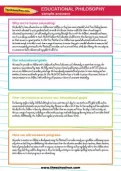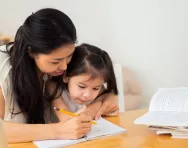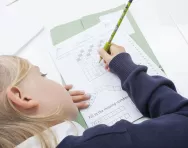Important update from TheSchoolRun
For the past 13 years, TheSchoolRun has been run by a small team of mums working from home, dedicated to providing quality educational resources to primary school parents. Unfortunately, rising supplier costs and falling revenue have made it impossible for us to continue operating, and we’ve had to make the difficult decision to close. The good news: We’ve arranged for another educational provider to take over many of our resources. These will be hosted on a new portal, where the content will be updated and expanded to support your child’s learning.
What this means for subscribers:
- Your subscription is still active, and for now, you can keep using the website as normal — just log in with your usual details to access all our articles and resources*.
- In a few months, all resources will move to the new portal. You’ll continue to have access there until your subscription ends. We’ll send you full details nearer the time.
- As a thank you for your support, we’ll also be sending you 16 primary school eBooks (worth £108.84) to download and keep.
A few changes to be aware of:
- The Learning Journey weekly email has ended, but your child’s plan will still be updated on your dashboard each Monday. Just log in to see the recommended worksheets.
- The 11+ weekly emails have now ended. We sent you all the remaining emails in the series at the end of March — please check your inbox (and spam folder) if you haven’t seen them. You can also follow the full programme here: 11+ Learning Journey.
If you have any questions, please contact us at [email protected]. Thank you for being part of our journey it’s been a privilege to support your family’s learning.
*If you need to reset your password, it will still work as usual. Please check your spam folder if the reset email doesn’t appear in your inbox.
How to track your home-educated child's progress

Today's children are under a lot of pressure to make progress at school, and to demonstrate that progress through tests. Indeed, Childline has reported a 200 per cent increase year-on-year in calls from young people about exam stress. That pressure is one of the reasons some parents choose to remove their child from school and educate them at home. But even if you're committed to letting your child progress in their own time, it can be hard to know if they're making good headway without the benchmark of test results.
'Home education is about progressing at your own pace. Whether you monitor this in the way it would be monitored in school is a subjective decision,' says Dr Alan Thomas, honorary senior lecturer at the Institute of Education, University College London and co-author of How Children Learn at Home (Continuum, £19.99).


Free home education planning pack & resources
- Guidance, templates & advice
- Practical tips from experts and parents
- How to establish a routine and set goals
During his 20 years of research into home education, Dr Thomas has found many parents prefer their child to develop autonomously. But some follow an academic approach, perhaps if they are planning for their child to go back to school at some stage.
Whichever method you follow, you should be able to see clear signs that your child is progressing.
Do you need to track your child's progress?
The Education Act 1996 says that parents have a responsibility to ensure their children get an efficient and suitable full-time education suitable to their age, ability and aptitude, at school or otherwise. While your child won't be taking formal tests like SATs if they're being educated at home, the local authority is likely to make contact with you on an annual basis to check how they're getting on, and will want to see evidence that your child is making progress.
But this doesn't have to be through formal testing: your evidence could be, for instance, examples of your child's writing from across the year, a list of books they've read, maths workbooks or a scrapbook about a project they've worked on.
'Children learn very quickly if they're interested in something, such as reading the stories they want to. The difference, compared to a school approach, is that you aren’t insisting they learn something if they don’t want to,' says Dr Thomas. 'You will know your child is progressing if they're taking an interest and happy to learn.' Collecting evidence of this as you work with your child is the best way to demonstrate that they're making progress.
An autonomous approach to progress in home education
If you're taking an autonomous approach to home education, where you're led by your child, the key to ensuring they make progress is to notice their particular interests and give them the opportunity to develop the interest further. If a book from the library on mini beasts goes down well, you could extend their learning by setting up your own bee hive, making honey sandwiches and counting how many different types of insects you can spot on a country walk. If your child shows an interest in origami, you could get the atlas out and read about Japan, and learn some words of Japanese together.
Learning autonomously means children will naturally gain a broad education, as their interests will be wide enough to encompass literacy, numeracy and other subjects. Plus, most importantly, they are likely to follow these interests through in greater depth, so their knowledge will be more thorough.
Don’t forget that you can progress too. As a home educator, keeping an eye out for topics and ideas that will engage your child means you can tap into their interests and find areas that they're keen to learn about and make progress in.
A structured approach to progress in home education
If you're following a more structured home education programme, perhaps with a set daily timetable and workbooks covering the curriculum subjects, you may prefer a structured approach to measuring your child's progress, too. At school, this is done in a number of ways: through observation, teacher assessment and testing. All of these can be replicated at home. For example, with observation, you might set your child a science practical to see how light affects plant growth. By watching them do the task, you can observe whether they've fulfilled the learning objective.
With ongoing assessment, you might give them a weekly writing or maths challenge, and see how their work develops and matures over time. Using workbooks can be helpful in structuring your child's learning and allowing you to see if they're making progress.
You can also give them tests at set intervals - perhaps at the end of each half-term, as would be the case if your child was at school. You could use past and practice papers (available to download for Key Stage 1 and Key Stage 2) and optional SATs papers to see how they're progressing in core subjects.
Joining a home education group is another way of measuring progress by comparing ideas with other parents and sharing knowledge amongst the children, but beware of direct comparisons: the defining feature of home education is that children learn at their own rate, so your child may seem streets ahead in some areas, but less advanced in others.
Whichever approach to learning and progress you take, keep in mind that the very act of home educating your child means you're invested in their progress: parental involvement is one of the biggest and most positive factors affecting children's learning.
Formal exams for home-educated children
Many home-educated children re-enter the school system either at the start of secondary school or soon after, typically around the age of 14. 'The vast majority of home educating parents acknowledge that the purpose of education is for their children to be able to make their way in the world,' says Dr Thomas. 'Home-educated pupils are also, far more often than not, keen to sit GCSEs and A levels because they understand the importance of having recognised qualifications in terms of getting on in life.'
This doesn't mean your child has to return to school. They can sit GCSEs, A Levels, the International Baccalaureate and vocational qualifications through a local assessment centre or college as an independent candidate, although you'll be responsible for their entry fees. They can do these in their choice of subjects, and the age when you consider them ready: for example, they could take some GCSEs at the age of 14 if they felt capable. 'I can’t think of any children I’ve come across who have failed their GCSEs because of being educated at home,' says Dr Thomas.
Some home-educated children never take formal exams, though, and this needn't be a barrier to entering higher education. UCAS points (for university applications) can be accrued via other routes such as music or drama exams, and some universities will take things like work experience and voluntary work into account if your child has good references. However, it's important to look carefully at the routes into your child's potential course or career in good time (before they'd need to start studying for GCSEs): if, for example, they want to study medicine, it's highly unlikely they'll get a place without three A levels, mainly in science subjects.





